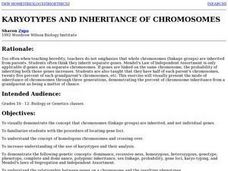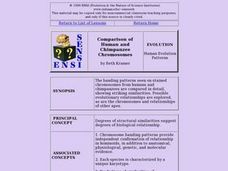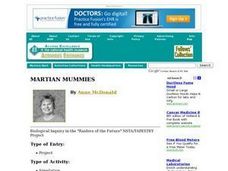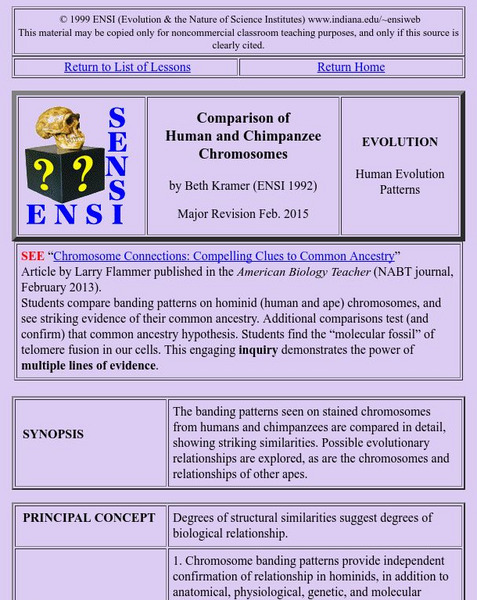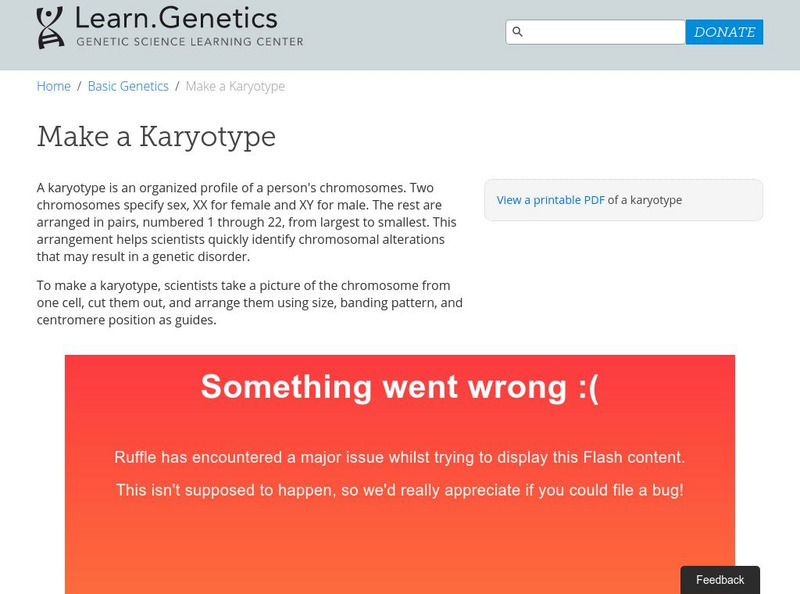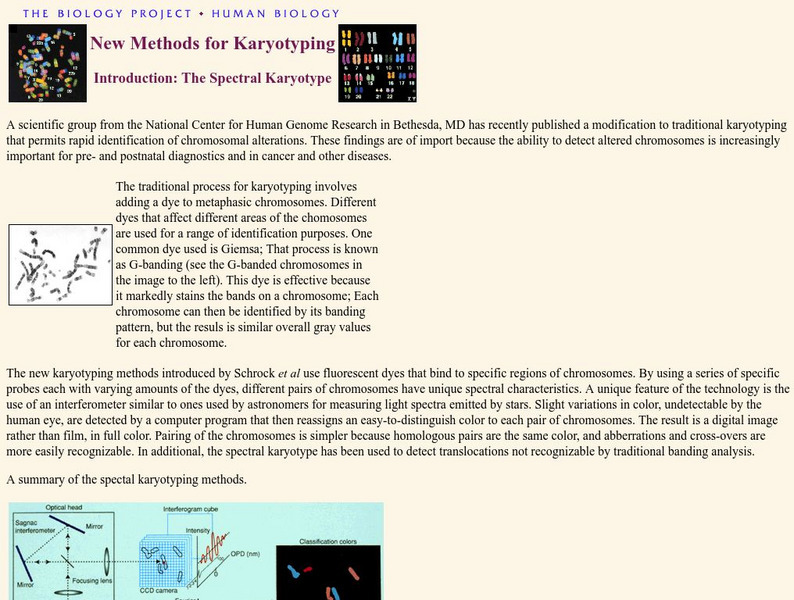Curated OER
The Human Genotype
Six different chromosome activites introduce biology aces to heredity, chromosomal abnormalities, sex-linked traits, and the human genome. The hands-on activites are fairly simple for the teacher to prepare and will prove to be both...
Virginia Department of Education
Genetic Variation and Mutations
Young scientists demonstrate their creativity while completing several activities, to assess genetic variations and mutations. Instructors provide a list of options and scientists choose to write a comic strip, create a book,...
Curated OER
Lesson 10: Karyotypes
Students predict traits of future offspring. In this biology lesson, students study karyotyping to predict genetic disorders. They research an assigned karyotype and present information about it.
Curated OER
Jurassic Park: The Science and Ethics of Genetic Engineering
Explore genetic engineering through an engaging "Jurassic Park" unit, which is an extensive use of a cross-curricular teaching event. Planned for AP Biology, English, and Calculus students, learners and teachers are involved for 4-6...
Curated OER
Chromosome Karyotyping
High schoolers explore chromosome karyotyping. In this chromosome karyotyping lesson plan, students use a chromosome kit to explore chromosome syndromes and disorders. They also produce a large model of a cell with chromosome to simulate...
Curated OER
Human Heredity Vocabulary
Ninth graders review the terms "aneuploidy," "fetus," and "karyotype" in this vocabulary learning exercise, which includes three multiple choice questions about each term. This activity could be expanded into a more developed vocabulary...
Curated OER
Chapter Fourteen Questions: Human Genome
This multiple-choice and short-answer quiz covers chromosomes, genetic disorders, and more. The multiple choice section could work as a pretest, as well.
Curated OER
Karyotypes and Inheritance of Chromosomes
Students explore the mode of inheritance of chromosomes. Given a scenario, students use the Human Genome sheet to determine inherited chromosomes. They illustrate the difference between genotype and phenotype. Students develop a model...
Curated OER
Reaching Into Your Genes
Students interact with a video to explore the basis for the science of chromosomes. They perform a chromosomal analysis called a karyotype and explore how seemingly minute errors in chromosomes can lead to devastating illnesses.
Curated OER
How Can You Predict the Characteristics of an Unborn Baby?
Students compare three sets of unlabeled human chromosomes and gather related data, trace chromosomes to pair them, and make observations about them.
Curated OER
Karyotype Puzzle
Students identify chromosome pairs based upon band patterns and location of centromere. They order chromosome pairs based upon size. Students differentiate normal karyotypes from abnormal karyotypes. They correctly record karyotype...
Curated OER
Comparison of Human and Chimpanzee Chromosomes
Young scholars actively engage in the careful analysis of chromosome banding patterns and identify examples of inversion in homologous chromosomes.
Curated OER
The Chromosome Connection
Students evaluate the degree of chromosome similarity and difference between humans and apes. Students infer about the relationship between a human and ape based on similarities found.
Curated OER
Modeling Allele Distribution Through Meiosis and Fertilization
The main objective of this activity is to illustrate the variation that results from crossing-over during prophase I of meiosis. Other sources of variation from generation to generation are: (1) independent assortment (223 possible...
Biology Junction
Cellular Division
Based on current scientific knowledge, all cells come from preexisting cells. Scholars learn about cell division, cell replication, mitosis, meiosis, and more with a PowerPoint. It describes the differences between prokaryotes and...
Curated OER
Martian Mummies
Students participate in "Raiders of the Future", a role play about futuristic scientists sending a spaceship to Mars for research and exploration. They collect geological samples for analysis, discover the ruins of an ancient...
Curated OER
More on Meiosis
In this meiosis worksheet, students fill in the blank that describes the process of meiosis. Students also draw the process of meiosis.
Curated OER
Who's the Father?
Learners analyze gels to determine parentage in this lesson about scientific evidence, investigation, and DNA concepts. The lesson includes a pre-activity worksheet, a final individual assessment, and student handouts for in-class...
University of Arizona
Biology Project: Karyotyping Activity
If you want an interactive way to practice karyotyping, this is it. There are three patient histories and karyotypes to use in diagnosing human genetic disorders. There is enough information on comparing chromosomes to get you started.
Indiana University
Ensi: Comparison of Human: Chimpanzee Chromosomes Lesson
This is a great lesson plan that combines Karoytypes and evolution. Students will recognize that the chromosomes of chimpanzees and humans are remarkably similar, then correlate that to their evolutionary relationship.
University of Utah
University of Utah: Genetics Learning Center: learn.genetics: Make a Karyotype
Drag and match the chromosome pairs to organize this human karyotype profile.
University of Arizona
The Biology Project: Human Biology: New Methods for Karyotyping
Read about the findings from the scientific group from the National Center for Human Genome Research, which published a modification to traditional karyotyping that permits rapid identification of chromosomal alterations.
PBS
Pbs Learning Media: Journey Into Dna
Travel deep into the human body to see exactly where your DNA resides. From the NOVA: Cracking the Code of Life Web site.









